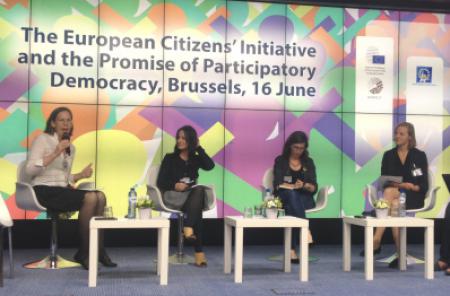Understanding the initial intention of the ECI and agreeing on its desired potential is not only crucial in order to put the ECI into the right context, but it also forms the basis for determining which revisions are necessary and which changes ought to be prioritised. Should a Citizens’ Initiative lead to a legislative proposal to be considered successful? Or is it sufficient for the initiative to raise awareness and start a debate?
Camps of believers
There seem to be three camps of believers. The first – and most conservative – camp is represented by the Council (consisting of the 28 member states), which asserts that the ECI should not be about legal change but about starting political discussion. On the contrary, the most progressive camp, which is escorted by the European Parliament, demands that initiatives must have a legal impact on EU politics, else citizens will not engage. Carefully meandering between these two opposing camps is the European Commission, which insists that stimulating public debate is a valuable contribution of ECIs, but admitting that legislative change is of course the final goal and that if down the road no ECI will lead to legal action we will have a serious problem.

Based on these aspirations, different improvements should be prioritised in the ECI. While some will argue that simple improvements, like a revamping of the online signature collection software, or raising public awareness of the existence of the tool, would be sufficient to improve the ECI, Democracy International is convinced – and actively campaigning – that more profound improvements are needed.
Democracy International's proposals for reform
For the ECI to reach its full potential, the rules governing the ECI (the Regulation 211/2011) require revision, including a more transparent and neutral admissibility check for ECI proposals (to alleviate the current 40 percent rejection rate), less extensive data requirements demanded from supporters of running ECIs (harmonising and simplifying data requirements rather than having 28 different ones), and a stronger follow-up to successful ECIs (obliging the Commission to respond with legal action within 12 months and otherwise bringing in the Parliament).
As Catherine Howe, moderator during the conference, said, for ECIs it’s not about reaching the finishing line, but about what comes afterwards. In this light, Democracy International has taken a lead in pushing for an improvement of the ECI so that it encourages citizens to take part in the race in the first place, and so it ensures a genuine prize at the end! In the upcoming months we will keep up the pressure when European decision-makers decide on the future of the European Citizens’ Initiative.
Background on the European Citizens’ Initiative
The European Citizens’ Initiative was introduced ten years ago into the EU’s Constitutional Treaty to connect the European institutions and decision-makers with the citizens. Three years of implementation have given us a preliminary idea of its success: after an initial oomph, the use of the ECI has been in dramatic decline, and by now, three years in, only one single initiative is up and running. Of the 51 ECIs that were proposed, only three managed to collect over one million signatures, and not one of them has led to new legislation.


